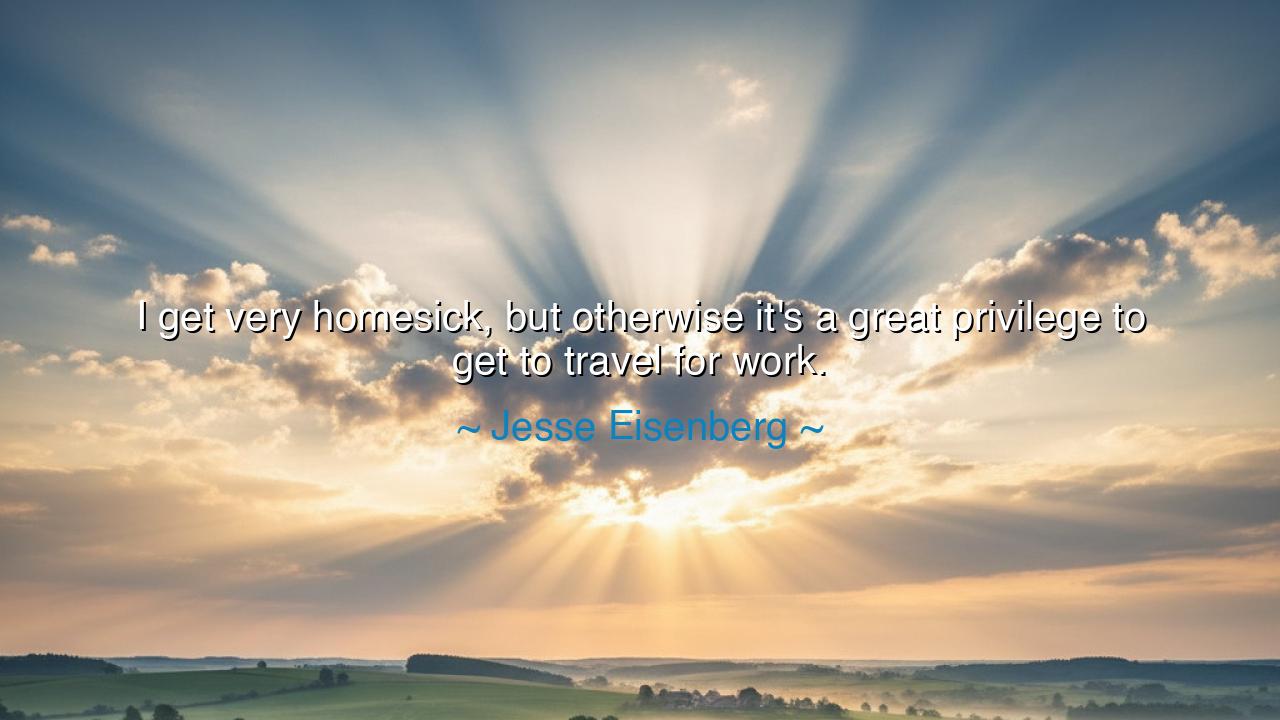
I get very homesick, but otherwise it's a great privilege to get






Jesse Eisenberg, with quiet honesty, once spoke words that capture the paradox of the human heart: “I get very homesick, but otherwise it’s a great privilege to get to travel for work.” At once tender and grateful, his reflection reminds us of the dual nature of all journeys—how they bring wonder and opportunity, yet also awaken longing for the hearth we leave behind. In this tension between absence and privilege, between homesickness and adventure, lies a truth as old as mankind’s wandering.
The first wisdom here rests in the confession of homesickness. To be homesick is to feel the invisible tug of the familiar, the warmth of loved ones, the comfort of known places. It is proof that one’s roots run deep. Eisenberg does not deny it nor mask it behind pride. Instead, he admits it openly, showing us that even in success, even in adventure, the soul aches for its anchor. The ancients understood this well: Odysseus, though offered immortal pleasures, yearned above all for Ithaca, for hearth and home. So too Eisenberg admits the eternal truth: absence sharpens love for what we leave behind.
Yet he also names the privilege of travel. To step beyond one’s borders, to see distant lands not as a tourist but as one entrusted with a task, is no small blessing. Eisenberg honors the gift of his vocation, which allows him to walk through cities and nations that many will never see. His humility shines here: he does not speak of entitlement, but of gratitude. He knows that travel for work is not a burden, but an opportunity, one that enriches the mind and soul. Gratitude, paired with honesty, becomes wisdom.
This paradox—of being torn between longing and privilege—echoes throughout history. Consider the scholars of the Renaissance, who journeyed across Europe to learn in foreign academies, yet wrote letters filled with yearning for their homelands. Or the soldiers of empires, who marched to distant provinces, tasting the marvel of new worlds while dreaming of the fields of their birth. Each knew what Eisenberg expresses: the heart is a divided traveler, both grateful for the road and longing for home.
There is also nobility in his words. To feel homesick is not weakness, but strength—it means one has something worth missing. And to call travel for work a privilege is not servility, but wisdom—it means one has learned that life’s opportunities, even when difficult, are gifts. Eisenberg’s reflection is a quiet heroism: not the roar of conquest, but the honest courage of one who bears the ache of absence while walking the path of duty.
The emotional depth of his teaching lies in its humanity. Many dream of travel as pure joy, forgetting the sorrow of separation. Others see only the burden of absence, forgetting the privilege of opportunity. Eisenberg reminds us to embrace both: to honor the longing for home and yet to give thanks for the road. Life itself is such a journey—between rootedness and adventure, between the hearth and the horizon. To acknowledge both is to live fully.
The lesson, then, is this: hold gratitude in one hand and longing in the other. Do not despise your homesickness, for it is proof of love. Do not despise your work, for it grants you purpose and often opens doors to the world. Instead, let both teach you balance. Cherish home more deeply because you have left it. Cherish the road more deeply because it takes you beyond yourself. In this union, the heart finds wisdom.
Practical counsel follows: when you travel, carry with you reminders of home—letters, photos, words of blessing—so that your absence does not become loneliness. When you are at home, cherish those moments, for they are fleeting and sacred. And in all journeys, whether near or far, let gratitude guide you, as Eisenberg teaches: for to travel for work, even with homesickness in the heart, is not burden but privilege—and to recognize this is to live wisely.






AAdministratorAdministrator
Welcome, honored guests. Please leave a comment, we will respond soon